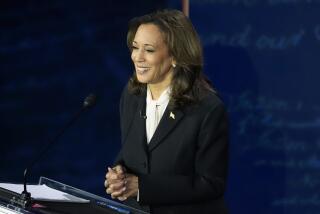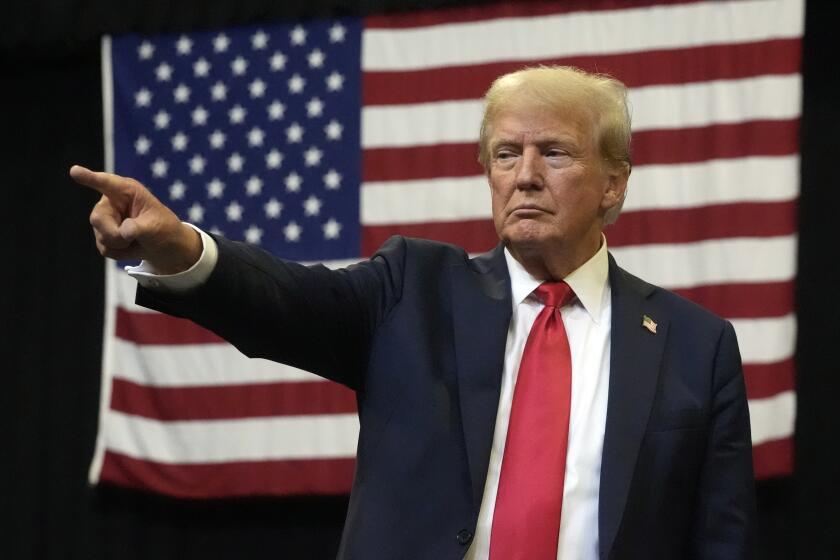Governor Moves to Ensure Adequate Supply of Power
Gov. Arnold Schwarzenegger took a first step Wednesday toward fulfilling a campaign promise to give California a comprehensive energy program, one he said would head off future electricity crises.
The governor’s proposal, made in a letter to the president of the California Public Utilities Commission, calls for a modest deregulation of the electricity market. The proposal was made public as a week of unseasonably hot spring weather revived concerns that a torrid summer could lead to tight power supplies and blackouts like those that crippled the state in 2000 and 2001.
“I encourage the PUC to move quickly to adopt this regulatory framework so that California’s consumers and businesses can begin to realize the benefits of lower electricity costs and stable energy supplies,” Schwarzenegger wrote.
The governor wants regulators to pick up the pace in implementing a 2002 law aimed at reviving the state’s wholesale energy market, allowing investor-owned utilities such as Southern California Edison Co., Pacific Gas & Electric Co. and San Diego Gas & Electric Co., to sign long-term contracts with independent power producers.
The governor also wants to move up by two years, to 2006 from 2008, a requirement that utilities have access to emergency power reserves equal to 15% of their peak demand. Utilities also would be pushed to submit plans that identify future power needs and to emphasize conservation, efficiency and renewable energy sources. In the past, the governor has urged utilities to get 20% of their power from so-called green sources, such as wind and solar power, by 2010.
State Sen. Debra Bowen (D-Marina del Rey), chairwoman of the Energy, Utilities and Communications Committee, cautioned against the state rushing into new energy policies. She urged policymakers to avoid making the sort of hasty changes that led to California’s 2000-01 electrical meltdown: “We’re going to be paying for that mistake for a long time.”
But utilities, independent power companies, some energy activists and academic experts praised the Schwarzenegger proposal as an important step in rebuilding the state’s private power-generation market.
“There’s been a flight of capital from the energy sector. Nobody can build anything,” said V. John White, executive director of the Center for Energy Efficiency and Renewable Technology, a Sacramento-based public interest group. Signing multiyear contracts with utilities will give energy producers the ability to secure financing from investors leery of sinking money into power plants here, White said.
Schwarzenegger wants utilities to be able to take advantage of low electricity prices by shopping on the open market and signing new long-term contracts; some of these contracts would replace the expensive electricity purchased by the state during the 2001 energy crisis.
The PUC has to take action to implement the 2002 law for those new competitively bid contracts to be negotiated. Schwarzenegger hopes to use his popularity and moral suasion to goad the PUC into action. Competitive pricing, the governor believes, will lower prices for all ratepayers.
By looking to the PUC, the governor may be able to get at least part of his energy program in place without getting bogged down in the Legislature.
PUC President Michael R. Peevey wrote to the governor that he was “pleased to hear that we are in agreement about the major electricity policy issues facing the state” and said he’s eager to work with Schwarzenegger in cutting rates.
The governor didn’t address a key component of the 1996 deregulation law: the since-suspended provision that allowed big companies and other large electric users to bypass utilities and buy power directly from generating companies.
But he supports the concept, and is promising to work closely with lawmakers as they consider two bills that would reinstate such “direct access” on a limited basis.
The governor’s embrace of the concept is unsettling to consumer groups. They’re worried that an exodus of major consumers would leave small business and residential consumers with higher bills as a utility’s customer base shrinks.
“The governor seems to have bought the story line of the people who want a return to retail competition lock, stock and barrel,” said Bob Finkelstein, executive director of the Utility Reform Network, a San Francisco ratepayer’s group. “That is the way that large customers get lower prices and leave the smaller customers with the utilities.”
More to Read
Get the L.A. Times Politics newsletter
Deeply reported insights into legislation, politics and policy from Sacramento, Washington and beyond. In your inbox three times per week.
You may occasionally receive promotional content from the Los Angeles Times.











